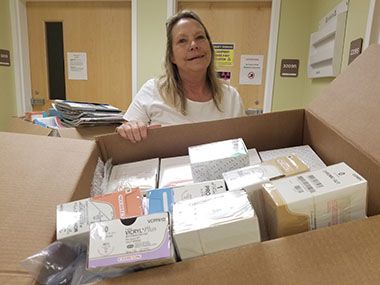Over the years, Pensacola State College’s Veterinary Technology Program has received numerous donations of medical supplies from area health care and veterinary providers.
This summer, Program Director Sarah Meyer-Paterson decided to pay the good deeds forward by helping others.
“I try to use as much as I can, but sometimes we get items that we just don’t use. That’s when we reach out to our veterinary community ─ those who rely on donations of goods and money,” she explained.
“This spring we received a huge box of suture material, and we were able to keep about half of it. The rest we are sending to the Rural Area Veterinary Services (RAVS).”
RAVS, a non-profit veterinary outreach program, combines community service and veterinary mentorship to bring free veterinary services to underserved rural communities where poverty and geographic isolation make regular veterinary care inaccessible.
Each year, six RAVS staff members and more than 350 volunteers provide essential veterinary care for more than 8,000 animals, all at no cost to the clients or communities. Also, the program provides valuable training and experience for hundreds of future veterinary professionals that goes far beyond anything they could learn in a classroom alone.
“As a student, I volunteered my time with them during spay/neuter clinics in rural Appalachia, serving impoverished pet owners who want the best for their animals, but need help doing so,” Meyer-Paterson said. “Each weekend, we would provide care and sterilization surgeries for up to 100 animals who would not have otherwise received care. I strongly encourage our students to volunteer for RAVS and one day, hope to take a cohort to help at a clinic. “
The Vet Tech program also donated six tubes of horse dewormer to the Panhandle Equine Rescue and expired suture material to Dr. Eduardo Celo for veterinary schools in the Philippines.
In a thank you note to the College, Celo said he sent boxes with various supplies ─ including books and journals ─ to the 13 veterinary schools in the Philippines.
“Thank you very much for your donations. I received two boxes from your College, and I cannot overemphasize how delighted I am,” he wrote in the note.
“Filipino veterinarians and vet school libraries do not receive free journals (“throw-away journals”). Many libraries cannot afford current professional journals.”
Celo explained that many supplies are imported from overseas to the Philippines, and are very costly.
“These items cost so much more than supplies that we obtain here and sometimes, routinely take for granted. I periodically buy the vet students scrub shirts, bandages, sutures, non-opioid medications when they go on sale or rely on donations ─ e.g., used nail clippers, catheters, endotracheal tubes ─ from a veterinary practice in my area,” he added.
Meyer-Paterson noted Pensacola State is not only impacting its own veterinary technology students but those across the globe.
“There is no sense in keeping items we can share with veterinary professionals across the globe and help animals across the world,” she said adding the program also donated a box of journals, older textbooks and supplies to international veterinary sources about once a year.

 PirateQ
PirateQ 
